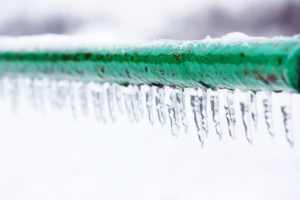Pipe Thawing in Northeastern PA
Archbald ∙ Carbondale ∙ Dunmore ∙ Fleetville ∙ Moosic ∙ Scranton ∙ Susquehanna ∙ Wilkes-Barre

When temperatures in the Scranton, PA, area drop, homeowners may find themselves suddenly without water. The culprit in these instances is almost always a frozen pipe. Any exposed, unprotected pipe can freeze once the temperature dips below the freezing point, leaving you without water.
If left untreated, the pipe can burst, creating costly water and plumbing damage. Decisive action is necessary at the first sign of a frozen pipe, and T.E. Spall & Son is ready to help you thaw that pipe and prevent future problems with freezing temperatures.
To get professional help with frozen pipes at your Scranton-area home, call or contact T.E. Spall & Son online today.
What Causes Frozen Pipes?
Pipes freeze when an exposed pipe comes in contact with freezing temperatures. Typically, your home will be constructed to prevent this, but if you leave a window or garage door open and the temperatures dip, you could face a problem.
Also, sometimes during renovations, pipes are left exposed that were once properly insulated and protected, creating issues with your plumbing. Once the pipe freezes, water can’t flow. As the water freezes, it also expands, which can cause the pipe to burst — creating a plumbing emergency.
What To Do With Frozen Pipes
When you discover a frozen pipe, your first thought may be to try to thaw it yourself. This can be dangerous. Hair dryers and heat lamps are electrical elements, and if they come in contact with water, you can start a fire or suffer electrocution.
Torches may seem like a better option, but an open flame is always a fire risk. Without a plumber, you don’t have the tools to determine if the pipe has started to crack from the pressure of the ice, so you’re at serious risk of causing a leak.
Instead, when you have a frozen pipe, call T.E. Spall & Son. We have the right equipment to detect cracks and thaw pipes slowly and safely. Our techniques are designed to minimize damage and significantly reduce the risk of a burst pipe. With the help of our skilled plumbers, you can have your pipes thawed and your water flowing again quickly.
Don’t attempt a DIY thaw of your frozen pipes and risk more damage. Call or contact us online to schedule a heating replacement or installation in the Scranton, PA, area.
How To Handle a Burst Pipe
If you don’t discover the frozen pipe in time and it bursts, call us immediately. While you’re waiting, you can:
- Turn off the water at the main shut-off valve.
- Open the faucet.
- Start cleaning up the water damage.
Burst pipes are plumbing emergencies and will require a plumber to address the problem. After fixing the pipe, our plumber will tell you what steps to take to avoid frozen pipes and costly damage in the future.
Top-Rated Plumbers Serving Scranton, PA
A frozen or burst pipe is never a pleasant experience, but when you call T.E. Spall & Son, your repair will be. We serve the Scranton and Wilkes-Barre area of Pennsylvania with integrity, striving to exceed your expectations every time we come to your home.
If you’re struggling with a burst or frozen pipe problem, don’t hesitate to call the experienced plumbing team at T.E. Spall & Son.
Contact us online or call for prompt frozen pipe repair in Scranton, Wilkes-Barre, and surrounding areas.
Frozen Pipe FAQs
How can I prevent my pipes from freezing?
Ensure all exterior wall spaces and crawl spaces are properly insulated, and add insulation to your pipes in any unheated areas of your home, such as the garage.
You’ll also want to keep your indoor temperature consistent, open all cabinets and vanities where there are pipes, and it’s a good idea to allow your faucets to drip during cold snaps.
What should I do when my pipes freeze?
The first thing you want to do is locate and shut off the main water supply. Next, you should open your faucets to relieve pressure within the pipe. If the affected area is small and the amount of ice is minor, you should be careful with any attempt to thaw the frozen section of the pipe.
Using a hairdryer or towels soaked with hot water can help. However, always use gentle heat to warm the pipe slowly, and never attempt to use anything like a handheld torch, lighter, etc., as there’s a considerable fire risk. Plus, rapid temperature changes can cause considerable damage to the pipe.
At what temperatures do pipes freeze?
While it’s most common when temperatures drop below 20°F, water pipes can freeze whenever the temperature drops below 32°F. The longer the temperature outside remains within these ranges, the greater the potential for frozen pipes.
Because our winter weather regularly dips into these low temperatures and stays there, the best protection is proactive winterization of your plumbing, including adding insulation, sealing leaks, and ensuring your heating system is in good condition.
How critical is a frozen pipe?
It’s a critical issue that requires immediate attention. The longer your pipes are frozen, the greater the potential that they could burst and cause extensive water damage to your home and personal possessions.
Because you have to shut the main water supply line off, you won’t be able to shower, do laundry, use the dishwasher, etc., until the pipe is thawed.
Do home insurance policies cover frozen pipes?
It depends on your policy. In most cases, insurance will cover the damage caused by a frozen pipe, but the homeowner pays for any pipe repairs. We don’t process insurance claims but will provide you with the documentation and receipts required to support your insurance claim.




